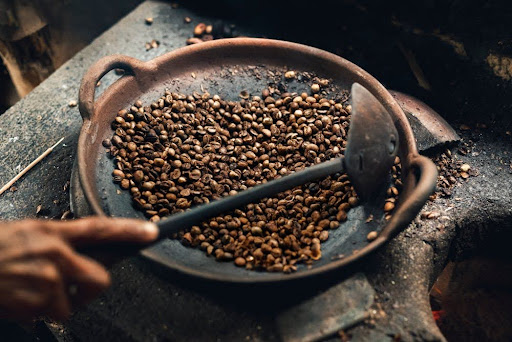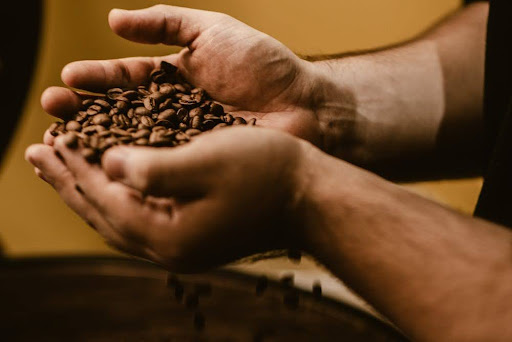Best Indonesian Street Food that…
From savory Nasi Goreng to sweet Klepon, discover the vibrant world of Indonesian street food…
Home » The History of Coffee in Indonesia




From savory Nasi Goreng to sweet Klepon, discover the vibrant world of Indonesian street food…
Indonesia Travel Bucket List is a must-have for travelers seeking adventure,
Indonesia Travel Bucket List is a must-have for travelers seeking adventure,
Ubud Story Walks is something different. It’s a fun, entertaining and refreshing way to delve into Ubud’s past. The knowledgeable guides place as much emphasis on how they tell a story as they do on what they’re sharing, which means all sorts of magical and mystifying details are revealed. I believe the best way to get to know a place is to walk its streets, which makes Ubud Story Walks one of the best ways to get to know Ubud.
We had a fantastic time walking around the historical centre of Ubud! Even though we've been based in Bali for a few years, we'd never had an actual tour of some of Bali's most iconic landmarks and learning about the history was fascinating. Our guide was hilarious and full of information and it was a lovely and relaxing way to learn so much. The tour was early in the morning which was perfect timing as the temperature was still cool and we were able to witness the morning bustle of Ubud's famous markets. 10/10 would recommend!
ExcellentBased on 163 reviews
 Vicky Ilankovan2024-12-13A great way to get to know Ubud, past and present. Win and Kelly were fantastic tour guide: knowledgeable, friendly, and open. I’d just landed in the country and this was the best welcome to immerse myself in some of the culture and historic as well as get a bit of a lay of the land. It was great to visit historic sites as well as the museum, and here fun stories. Bonus points for traditional sweets! Many thanks to both. Would definitely recommend this walking tour
Vicky Ilankovan2024-12-13A great way to get to know Ubud, past and present. Win and Kelly were fantastic tour guide: knowledgeable, friendly, and open. I’d just landed in the country and this was the best welcome to immerse myself in some of the culture and historic as well as get a bit of a lay of the land. It was great to visit historic sites as well as the museum, and here fun stories. Bonus points for traditional sweets! Many thanks to both. Would definitely recommend this walking tour LH Sim2024-12-10Joe was our guide for the Ubud Story Walk Tour : Past To Present. He is very professional and knowledgeable who has many interesting stories to share. During the tour, he showed pictures related to the history for our better understanding. Besides pictures, he also showed us coins that were used in the past. Apart from being proficient in conducting the tour, he is also a very caring guide as he offered us sunscreen, mosquito repellent prior to his tour and brought us snacks and water when we had our short break during the tour. Thank you Joe for the excellent commentary. Will definitely join the other Ubud Story Walks on my next trip to Bali.
LH Sim2024-12-10Joe was our guide for the Ubud Story Walk Tour : Past To Present. He is very professional and knowledgeable who has many interesting stories to share. During the tour, he showed pictures related to the history for our better understanding. Besides pictures, he also showed us coins that were used in the past. Apart from being proficient in conducting the tour, he is also a very caring guide as he offered us sunscreen, mosquito repellent prior to his tour and brought us snacks and water when we had our short break during the tour. Thank you Joe for the excellent commentary. Will definitely join the other Ubud Story Walks on my next trip to Bali. Jessica Hübner2024-12-05Ubud story walk past to presents was one of our favorite things to do in Ubud. Our guide Joe was super fun and very informative! Thank you Joe for the great time we had. I highly recommend this tour
Jessica Hübner2024-12-05Ubud story walk past to presents was one of our favorite things to do in Ubud. Our guide Joe was super fun and very informative! Thank you Joe for the great time we had. I highly recommend this tour Andrea Slosar2024-12-03I was on two tours and I really liked them. They are beautifully and comprehensively designed. Old black and white photos are an interesting addition. I was especially impressed by Windari with her communication skills and knowledge of the English language and Balinese culture. I wish the whole team much success in their future business and on discovering and solving pieces of the puzzle of Balinese culture.
Andrea Slosar2024-12-03I was on two tours and I really liked them. They are beautifully and comprehensively designed. Old black and white photos are an interesting addition. I was especially impressed by Windari with her communication skills and knowledge of the English language and Balinese culture. I wish the whole team much success in their future business and on discovering and solving pieces of the puzzle of Balinese culture. Neeraj Goswami2024-12-01I went on two walking tours, loved both! The guides Ira and Win shared excellent insights on Balinese culture, history and traditions - helping me understand local context, beyond the usual pics on social media. I hope they add many more such interesting tours in the future!
Neeraj Goswami2024-12-01I went on two walking tours, loved both! The guides Ira and Win shared excellent insights on Balinese culture, history and traditions - helping me understand local context, beyond the usual pics on social media. I hope they add many more such interesting tours in the future! Vinay Kashyap2024-11-26It's an essential part of a traveller's journey to know the history of a place he visits and my decision to choose Ubud Story walks was a good one. Joe, the guide took us through Ubud, the past to present and the walk was very informative. Its a good initiative done by a small team and I am happy to learn the efforts that the team is putting. Those who are coming to Ubud must consider opting for their guided tour.
Vinay Kashyap2024-11-26It's an essential part of a traveller's journey to know the history of a place he visits and my decision to choose Ubud Story walks was a good one. Joe, the guide took us through Ubud, the past to present and the walk was very informative. Its a good initiative done by a small team and I am happy to learn the efforts that the team is putting. Those who are coming to Ubud must consider opting for their guided tour. tamara fields2024-11-26Enjoy a lovely morning with Ira as she expland the story of Bali, Ubud, Hinduism, the style of the houses and much more. Would recommend this walk to anyone that is interested in connected with the history and culture of bali while having someone who can answer your questions to have a deeper look into the life of the people living here.
tamara fields2024-11-26Enjoy a lovely morning with Ira as she expland the story of Bali, Ubud, Hinduism, the style of the houses and much more. Would recommend this walk to anyone that is interested in connected with the history and culture of bali while having someone who can answer your questions to have a deeper look into the life of the people living here. David Hodgins2024-11-25We had a lovely and informative morning walk with Win. Her perfect pace, both physically and with information sharing , provided us with a rich understanding of Bali’s history and culture
David Hodgins2024-11-25We had a lovely and informative morning walk with Win. Her perfect pace, both physically and with information sharing , provided us with a rich understanding of Bali’s history and culture Jill Boulter2024-11-22Great walking tour of Ubud. Ira was very knowledgable and spoke good English. Nice places to stop, little alleyways and quieter parts of Ubud. Very well looked after. Would recommend 👍.
Jill Boulter2024-11-22Great walking tour of Ubud. Ira was very knowledgable and spoke good English. Nice places to stop, little alleyways and quieter parts of Ubud. Very well looked after. Would recommend 👍. Shafiga Elshan2024-11-15It was an amazing experience to learn more about Bali's history and culture. Our guide, Ira, was incredibly knowledgeable, positive, and caring. Thank you for such a wonderful experience!
Shafiga Elshan2024-11-15It was an amazing experience to learn more about Bali's history and culture. Our guide, Ira, was incredibly knowledgeable, positive, and caring. Thank you for such a wonderful experience!